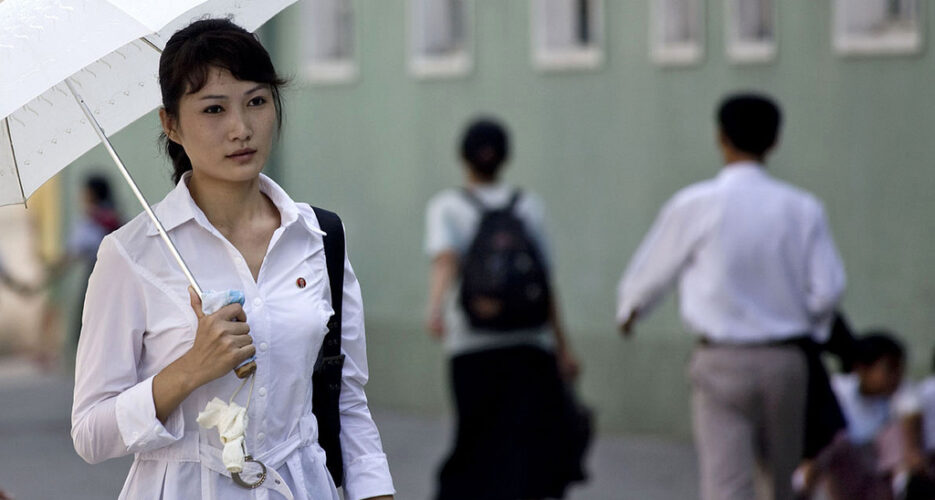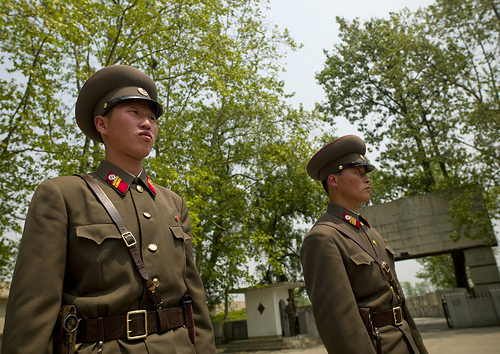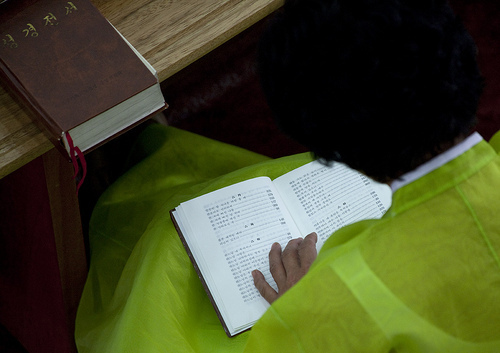About the Author
Fyodor Tertitskiy
Fyodor Tertitskiy is a lecturer at Seoul’s Korea University. He is the author of "Accidental Tyrant: The Life of Kim Il-sung" and several other books on North Korean history and military.

Get behind the headlines
|
Analysis The good things in North KoreaTaking a moment to recognize good art, good scholarship and good people
Fyodor Tertitskiy June 5, 2016  North Korea beauty in Pyongyang by Eric Lafforgue on 2008-09-08 11:02:56 North Korea is a country with a very bad, and mostly well-earned, reputation. It is often presented as some sort of “ideal” dictatorship: saying that something is “like in North Korea” is equal to saying that this thing or policy is unfair, oppressive, vicious, totalitarian. However, North Korea is not hell, and if one looks carefully it is actually possible to find some good things about this country. Some of these came to life thanks to initiatives of the North Korean leadership (mostly Kim Jong Il, who was less of a cruel person than his father or youngest son), some managed to survive decades of dictatorship and some appeared despite the policies of the Kim regime. PAINTINGS  Kim Jong Il loved art. However, that which was called by this word in his father’s North Korea could really be called “art” only by a person with a, let’s say, very special sense of aesthetics. Kim Il Sung’s North Korea recognized only one type of art: socialist realism. Thus a North Korean painting was supposed to be just poster-type propaganda. Old North Korea pictures featured the Fatherly Leader dwarfing the masses of people – just like Chairman Mao did in China – soldiers, ready to defend socialism at the cost of their lives, as well as workers and farmers, who, following the Party’s command, managed to over-fulfill plans.
In 1994 the Korean people, to directly translate a quote from the DPRK’s Central Yearbook, “with pain in their heart bid their farewell to the beloved and respected Leader comrade Kim Il Sung – the deeply venerated great thinker and philosopher, who appeared in the half-10 millennia of history for the first time, the peerless patriot, the legendary hero, the outstanding military strategist, the ever-victorious iron-willed commander, the greatest of the great, the one, who is unanimously venerated by all the people of the world.” Kim Jong Il, who took power after this momentous event, had significantly eased and sometimes completely abolished restrictions on painting genres. Thus North Korea got its own version of impressionism – a completely unthinkable thing under Kim Il Sung. Painters started to draw pictures on non-political topics: a village, a city street, people walking under rain. And even in ideological pictures a certain novelty of form was born. The old poster art lives on, of course, but in general North Korean paintings now definitely have a chance to compete on the international market. It is no surprise that those North Korean painters who defect to the South have no problem finding a job. MUSIC The situation with music was quite similar: Under Kim Il Sung, the state wanted music to be ideologically correct. Jazz was especially criticized: It was perceived as a filthy, degenerate, abominable bourgeois genre. One possible strategy for an artist was composing music and then putting an ideologically impeccable text on it. The author’s favorite example is the song “For Us to Live as in Those Days” (그때처럼 우리가 살고있는가). Both the text and the clip are in 100 percent match with state ideology: We should inherit the spirit of the Korean People’s Army, who are to “liberate the southern half of the Republic,” but the music itself is different: calm and rather beautiful. Try to watch the clip, and then minimize your browser’s window and listen again – experiencing only the music and not the visuals should leave you with a rather different impression. Under Kim Jong Il it all changed. The previously forbidden genres became permitted and welcomed. North Korea even got its own jazz bands. Surely, the Fatherly Leader had taught that it was a symbol of rotten capitalism, but the Commander loved it – and the immortal instructions of his father were quickly forgotten. OFFICERS: FORMER PRIVATES Armies are divided into soldiers and officers. In other words some military men start their service as privates and some graduate from an academy and after graduation are promoted directly to second lieutenant. This is a huge gap in starting positions, thus a private who manages to rise through ranks so far that he becomes an officer is an extremely rare exception. In the Imperial German Navy there was even a special word for such people: They were called Volksoffiziere, literally “officers from the common people.” This system has its roots in European feudalism. In old Europe, the officer corps was conscripted from nobility and privates from commoners. Logically, the appearance of an “officer from the common people” was as rare as a commoner being granted nobility. In the modern world the nobility is an almost extinct institution, but the “military nobility” – the officers’ corps – is very much alive. And suddenly it is North Korea that is an exception.  In the DPRK, with a few very rare exceptions, a person cannot enter an academy without serving in the military as a private first. Hence almost all officers of the People’s Army know what it is to be a private. The North Korean state emphasizes this in their internal publications: “Look, only we have such an understanding between officers and soldiers, unlike the ‘puppet army’ (in South Korea).” The author is not a military man, and it is possible that an army actually benefits from a system where there are soldier and officer castes. It is equally possible that this system survives solely due to the conservatism of human society. In any case, it is quite fascinating that such an egalitarian alternative to this system appeared in no place but North Korea. GOOD HISTORIANS In communist countries, there was an interesting tendency in the humanities: Most really good scholars studied the ancient times. The cause was simple: modern studies were controlled by the state censorship, and making any statement which contradicted either to the doctrine of Marxism-Leninism or the state’s current policy would have been impossible. When it came to old times, one’s freedom of expression was significantly greater. This model is less applicable when it comes to North Korea, since the Fatherly Leader used to pass down some wise instructions about the past. Being an unsurpassed genius, he explained that the Korean language developed autonomously and had no connection to any foreign language, hence destroying North Korea comparative linguistics. In his infinite wisdom, Kim Il Sung stated that Tangun, the legendary founder of the Korean nation – who was, according to myth the son of a heavenly deity and a bear – was a real person. North Korean archeologists had to find Tangun’s grave and skeleton. However, in the fields untouched by the finger of the Great Generalissimo, the situation was less grim. The best example, would probably be the recently instituted “Topics in the History of Korea” (조선부문사) series, published for export. The level of research in this series in higher than in the vast majority of North Korean books, and one of these titles, “The History of Education in Korea,” after some editing could even compete with some South Korean research. When one takes into consideration that a North Korean historian does not have the Internet and faces heavy censorship and restricted access to most modern sources and literature, publishing such a book truly seems like getting a medal in the Paralympic Games.
Another example: North Korean historians treat some aspects of the past with more honesty than their Southern counterparts. The museum of the Koryo kingdom (918-1392) in the North Korean city of Kaesong is, to my knowledge, the only museum in Korea which sheds light on medieval slavery. Slavery in Korea was abolished only in the late 19th century by a pro-Japanese government, but it is not really a topic for an intense discussion, unlike in, for example, the United States. “Well,” most South Korean say, “there was such a thing, and it was obviously bad – so what more should we say on the subject? Let’s move on.” And in Kaesong, there is a stand showing market prices in old Korea. Here is an ox – it cost 400 phil, and here is an adult man – 100 phil – and a woman – 120 phil. A girl could have been bought for 60 phil and a boy for 50. One simple stand shows the horrible nature of slavery, that valued the life of a living human being less than that of cattle. This stand was installed thanks to efforts of the local researchers, although one should recognize that here their approach did not contradict state ideology. TRANSLATION WORK North Korea does not publish many foreign books, as each publication must get a series of approvals from censors. The translation market is small and there is significant competition to get a job: Pyongyang University of Foreign Language ranks amongst the most prestigious in the country. Maybe this is why translation quality in the North is generally higher than in the South, since in the South translation is a mass-produced product. One cannot rule out the possibility that in the case of unification the translation market would be seized by the Northerners. I would like to talk in some more detail about the most unusual of North Korea’s translation projects: the translation of the Bible. Christianity is persecuted in the North and missionaries face arrest and punishment at the hands of secret police. However, North Korea officially denies this and claims that the DPRK’s Christians are united in the Union of Korean Christians, a state-run organization. This union is seemingly as “authentic” as the DPRK’s two “minor parties.” However, it does exist. Kang Ryang Uk, Kim Il Sung’s relative who led this organization, represented it in 1972 during the inter-Korean meeting. When he was asked by the Southerners if the Bible was distributed in the North, he answered: “We don’t really have any believers, so there is not anyone to get it.”  This situation was quite embarrassing, and Pyongyang decided that the country must have its own Bible. The translation was completed in the 1980s. In some time the North Korean Bible was smuggled outside the country (probably with the help of the Christian underground) and has been used by South Korean missionaries since that time. For many Southerners it is hard to imagine that the North having its own translation of the Christian scriptures and thus an urban legend was born saying that this translation was done by missionaries who worked with South Koreans. The author has a copy at home: It is much better translated than the standard South Korean version. NOBLE INDIVIDUALS
Finally, the most wonderful thing about North Korea is when the people in the country acted according to the voice of their consciences, not the logic of the system in modern DPRK trade and market relations. Here are three examples; from simply behaving as a good person to saving life of a child. *** I’ve been told by a North Korean friend of a girl planned an escape from the DPRK. Everything was prepared, the border guards were duly bribed. It was night and all that was left was to cross the river: on the other side was China. And suddenly the girl understood that she had not considered that she did know how to swim. A border guard soldier volunteered to help her – for free. They crossed the river together. *** Kang Chol-hwan is the former prisoner of Yodok concentration camp. In his memoirs he told about a teacher in the camp’s school named Kim Ki Un. Most of the teachers treated their students cruelly: Beatings were just another part of life. But Kim Ki Un was different. He talked with a calm voice, never ever raised his hand to a pupil and behaved as it were a normal school in Pyongyang – not in the revolutionization zone of the Administration Center for re-settlers #15 “Yodok.” It is hard for anyone – an inmate, a guard or a civilian employee – to remain a human being in such a place. Kim Ki Un managed to do so. *** There’s a story of family of five – father, mother and three children – who lived in Pochon county. In the mid-1990s famine struck North Korea. The countryside suffered the most. The parents and the young brother died and the two remaining children would have shared their fate had it not been for a local party secretary who came to their house one. The official brought corn – lots of corn, 10 kilograms. He fed the hungry children and advised them to leave for Hyesan – the capital of the province. Before the children left, the old man gave them some opium – it was well-priced in North Korea at that time and one could have exchanged it for food. The brother later died from fever, but the sister managed to survive and flee from China. She was lucky: some kind Chinese people provided her with shelter. She lives in Harbin now and is married to a Chinese man. If not for the party secretary, she would have probably died in 1995. *** One day – probably when we are still alive – the North Korean regime will fall and with it the iron curtain separating the country from the outside world. North Koreans will see that the DPRK was not a respected and prosperous superpower, but rather the poorest, cruelest and least free state in East Asia. The downfall of the Kim regime is likely to result in the unification of Korea: i.e. with the Republic of Korea absorbing the DPRK. This will be the time of the greatest shock and stress. People will be looking for a new identity: Who are we, whom should we trust, how should we build a new life? Many emigrants have such an identity crisis and it sometimes causes them to develop extreme love or hatred for their old or new motherland. In case of unification, all North Koreans – millions of them – would be like emigrants and all of them will face such an issue. If a Northerner in such a future would remember that North Korea is not just about famine, blood and executions, but also about Pyongyang’s cold noodles, painters’ landscapes, Pyongyang jazz bands, high-quality translations and people who helped others – sometimes risking themselves – it would be much easier for him/her to integrate. Otherwise, such a person may develop love for Kim Il Sung – a strong, powerful leader – for nuclear weapons – which made the world tremble – and for the secret police – the loyal sons of the fatherland who administered punishment that traitors most definitely deserved. Such people would exist: each mass murderer has its own bunch of followers. Because of nationalism, these are most numerous at the murderer’s homeland. But the more we remember and talk about good things which preserved in North Korea the less numerous the army of Kim Il Sung’s followers will be. North Korea is a country with a very bad, and mostly well-earned, reputation. It is often presented as some sort of “ideal” dictatorship: saying that something is “like in North Korea” is equal to saying that this thing or policy is unfair, oppressive, vicious, totalitarian. However, North Korea is not hell, and if one looks carefully it is actually possible to find some good things about this country. Some of these came to life thanks to initiatives of the North Korean leadership (mostly Kim Jong Il, who was less of a cruel person than his father or youngest son), some managed to survive decades of dictatorship and some appeared despite the policies of the Kim regime. Try unlimited access
|
Fyodor Tertitskiy is a lecturer at Seoul’s Korea University. He is the author of "Accidental Tyrant: The Life of Kim Il-sung" and several other books on North Korean history and military.

Specialist news and analysis,
research tools, and unique data sets
Internet Explorer is not compatible with this website. We instead recommend using Chrome, Edge, Firefox or Safari.
Microsoft ceased supporting IE 10 and older in 2016.
In addition, Microsoft cyber-security chief Chris Jackson has been urging users to stop using the browser since February 2019.
Join the influential community of members who rely on NK News original news and in-depth reporting
Learn MoreEnter your details below
Don't have an account? SIGN UP
Join the influential community of members who rely on NK News original news and in-depth reporting
Learn MoreFor more pricing options, click here.
Already have an account? SIGN IN
Join the influential community of members who rely on NK News original news and in-depth reporting
Learn MorePlease enter your username or email address. You will receive a link to create a new password via email.
Don't have an account? SIGN UP

